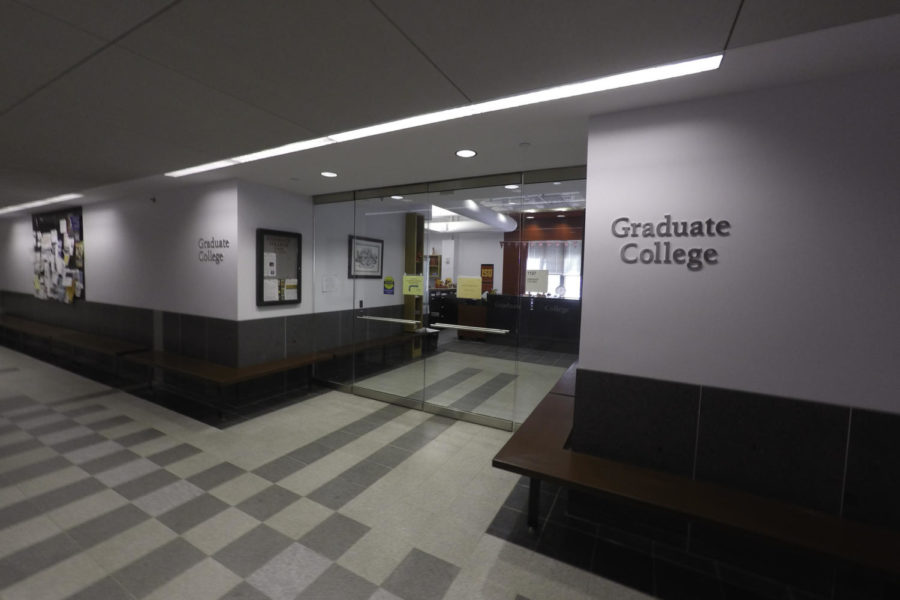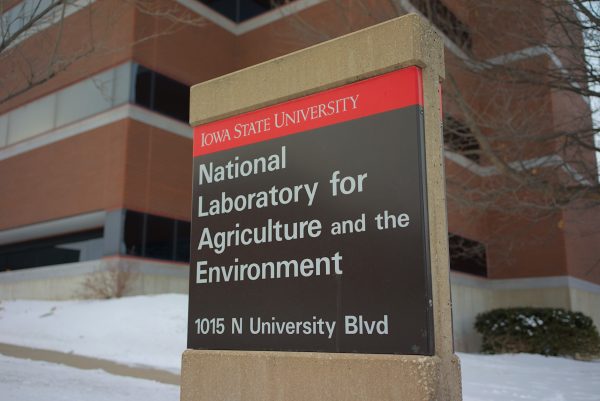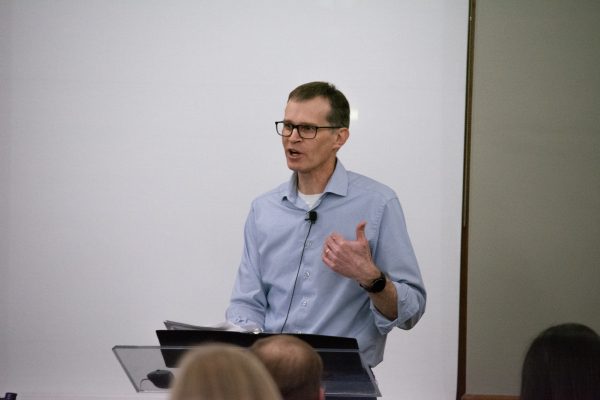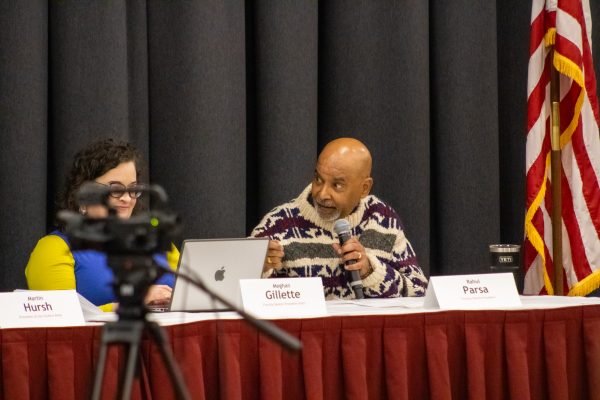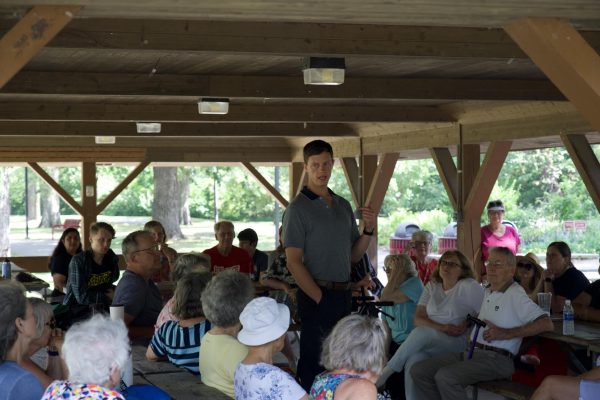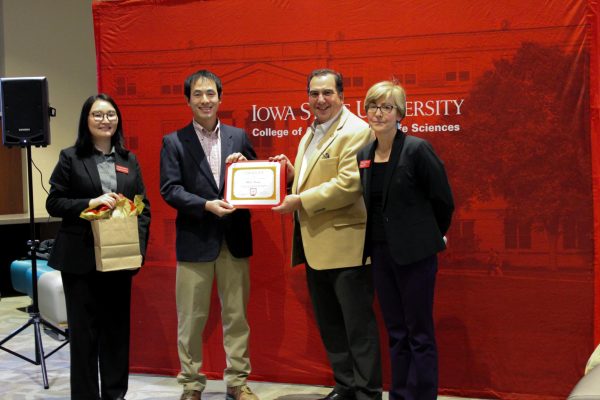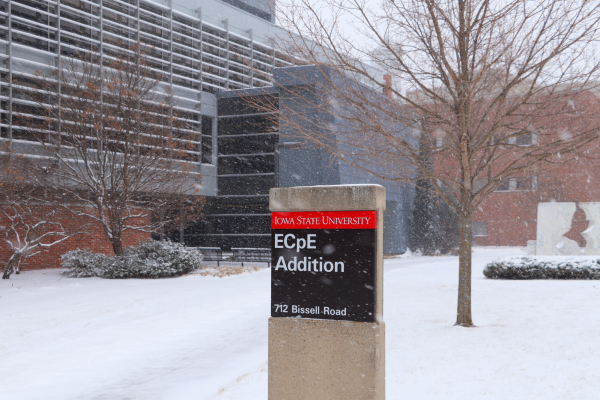Bridging the GAPS for graduate students
Jonathan North/Iowa State Daily
The Graduate College offices in Pearson Hall will be renovated during the summer. Part of the space will be provided to the new Academic Communications Program. The center contains the graduate peer mentor program, which has trained consultants since 2014.
The Graduates for Advancing Professional Skills (GAPS) program teaches graduate students the skills necessary to succeed in an industry or research profession.
Program participants learn the educational structure, which helps adapt and improve one’s project management skills from industry to academic research. The program bridges the gap between graduation and entering academic or industry professions.
The program has three main goals to prepare students for their future careers:
- Improve professional skill training for graduate students
- Implement and retain professional skills through thesis research
- Establish a graduate learning community and share our learning experience
Shan Jiang, associate professor in the materials science and engineering department and the program’s creator, said the program was designed to assist graduate students with communication skills.
Jiang said the GAPS course, MAT E 580X Advancing Professional Skills for Thesis Research, trains students in project management skills and the implementation of these skills within their thesis research.
Jiang said while working for Dow, a chemical corporation, he received management training and believed the skills he learned were unnecessary. He said he experienced somewhat of a culture shock working in the industry compared to an academic setting, which changed his beliefs and values surrounding these skills.
Jiang said he eventually decided to return to the field of academia at Iowa State because of his love for fundamental research and teaching. He said the GAPS program was created to allow graduate students to learn and grow in an environment that mimics industry work.
“These are very simple tools, and when I explain [the skills], one might even laugh at me and say, ‘Professor Jiang this is so simple,’ but in reality, we never talk to students about these, but if you talk to graduate students, nine out of 10 will say they have a hard time managing time,” Jiang said.
Jiang said many students expressed interest in networking, so he wanted to give them a chance to practice the speech, teach them how to introduce themselves and practice within the classroom.
“It’s a class that’s meant to focus on the skills beyond technical training, which we have been doing very well over the years,” Jiang said. “However, I did see the gap when students were trying to apply to jobs, and these [skills] become important.”
Jiang said he tells his students the most important principle for communication is not what you want to say, but the trust of between student and professor.
He said a special moment he remembers was when he provided his class with a case study example of a student who failed to communicate, and multiple students related to the example and learned from it.
“It’s such a great learning experience because it’s not about how well you can speak English or how smart you are,” Jiang said. “It’s about these [communication] principles you have within your mind.”
Jiang said after running the program for three years, the students who benefited most were those who were open-minded to the concepts and saw the need and importance of management and communication skills.
Efraín Rodríguez-Ocasio, a Ph.D. candidate in chemical engineering and participant of the first cohort for the GAPS program, said the course helped with self-accountability and effective communication.
“I think it was just a broad, broad spectrum of management skills that I think are useful to any grad student and, you know, are good for professional development,” Rodríguez-Ocasio said.
Rodríguez-Ocasio said in graduate school, students need to know how to manage their own projects, schedule experiments, use resources responsibly and hold themselves accountable.
“No one really teaches those skills, which are classic project management skills, so I think that was the main focus of this program, [which] was to provide those skills that are very valuable in the industry,” Rodríguez-Ocasio said.
Rodríguez-Ocasio said he was interested in learning more and continuing to look for resources. He said the program was a good introduction, and it covered enough for the scope of what skills graduate students need for success.
“A lot of times we rely a lot on our advisers, which is great, but they’re really more for mentoring and guidance and not necessarily to micromanage us,” Rodríguez-Ocasio said. “Developing skills to be able to conduct research on your own and work independently will definitely serve you well whether you want to continue in academia or you want to go into industry, so if anyone is struggling with this area of use, this is definitely the program for you.”
Yiqi Liang, majoring in higher education with a master’s degree in aerospace engineering, a graduate student assistant with the department of materials science and engineering, and the teaching assistant for the program course, said the program provides a safe space for students, specifically international students, to communicate and ask questions without fear of judgment.
Jiang said as a graduate student assistant, Liang assists with organizing the class to support the other students and is currently performing research based on the program.
Liang said she originally saw herself working in an industry profession; however, she was persuaded by her adviser to pursue the GAPS program.
She said as an international student and a woman, she struggled with confidence and communication skills proceeding graduation and felt somewhat alone in her field.
“It’s so interesting that the course is presenting interdisciplinary work as well because they have people from different backgrounds and different majors coming into a classroom where we share about our research or our interests and challenges, and somehow it made me feel that I’m not alone,” Liang said.
Liang said she benefits greatly from the course’s content and interacting with students who are part of the program as well. She said sharing stories with others and making connections created a comfortable environment for her.
“I was staying up until 3 a.m. some nights, so [GAPS] helped me in finding a more focused way to do research,” Liang said.
Liang said the program also helps boost students’ confidence and communication abilities, specifically in engineering and STEM, who lack the necessary social skills for success.
“Maybe they’re shy, or maybe I was really shy to work with others and [did not] really care about the team project aspect versus working at an education, but we have to practice working with each other, especially during class projects or class discussions, as those are ways to help to form those skills,” Liang said.
Liang said the curriculum differs from her engineering courses, as the GAPS professors integrated many discussion activities that prompt communication and collaboration.
“Dr. Jiang is so nice […] It doesn’t seem like he is a professor role in the class–more like we are colleagues, friends, to talk about our challenges or behind-the-scenes stories, and this was really good for people to learn,” Liang said.
Liang said she believes that while the program is geared toward and primarily benefits STEM students, the program can apply to non-STEM graduate students who might be interested.
“They (students) are building a community to support each other’s learning, so we’re putting ourselves out there and asking questions, and we learn a lot from the discussion,” Liang said.
Manish Kumar, a graduate research assistant in materials science and engineering and a former program student, took Jiang’s course fall semester of 2022. He said the program is efficient in helping graduate students with communication and management skills.
Kumar said his academic adviser recommended he look into joining the program, and after attending a workshop, Kumar decided it was the right fit for him.
“It is clear the set of skills you need after undergraduate studies,” Kumar said. “For example, in industry we need to have certain communication skills to talk to industry [professionals], say our ideas in a better way and collaborate.”
Along with communication skills, Kumar said project management, how to correctly write emails and time management skills are all valuable things he learned within the program, which have helped him professionally thus far.
Kumar said discussions in class were the most memorable class work and activity. He said people from different backgrounds could bounce ideas off and learn from each other.
“I would say specifically for graduate students to enroll for this program in the earliest days [possible] because this helps a lot, again, in managing time and in communicating with others [and] how to prepare a proper presentation or proper [speech] for a conference,” Kumar said.
Kumar said if he were to change anything, he would want longer class periods and more engagement because those aspects helped him the most during his time in the program.
“[The program] could increase the class time, and I would want to talk about topics in more detail and maybe have more guest lectures,” Kumar said.
Your donation will support the student journalists of the Iowa State Daily. Your contribution will allow us to purchase equipment, send our student journalists to conferences and off-set their cost of living so they can continue to do best-in-the-nation work at the Iowa State Daily.


